#ibn ‘arabi
Text
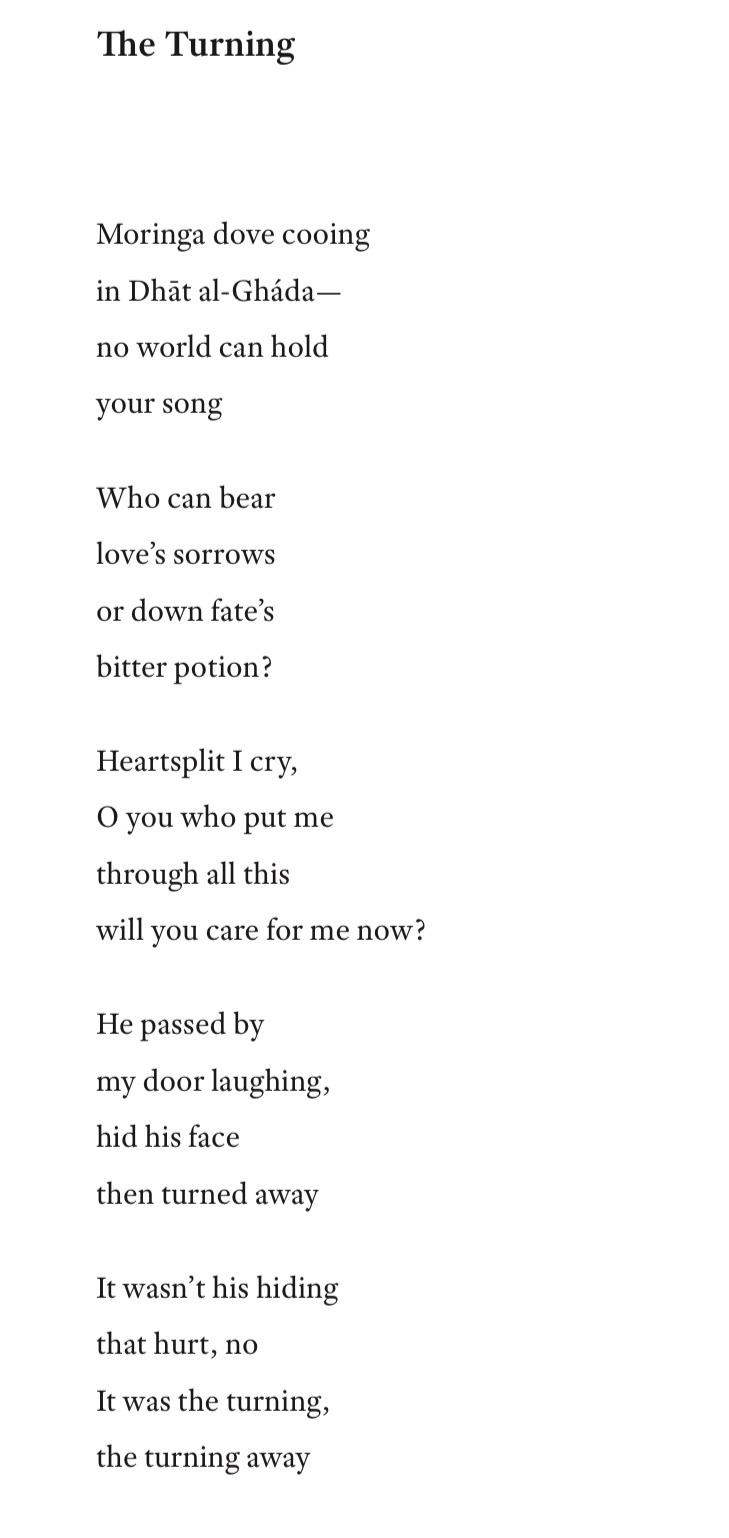

—Ibn ‘Arabi, The Translator of Desires
#literature#poetry#arabic poetry#ibn arabi#ibn ‘arabi#the translator of desires#sufi poetry#sufism#mysticism
91 notes
·
View notes
Quote
I am no one in existence but myself, so –
Whom do I treat as foe and whom do I treat as friend?
Whom do I call to aid my heart, pierced by a penetrating
arrow,
When the archer is my eyelid, striking my heart without an
arrow?
Ibn 'Arabi, from "Treatise of Unification," The Universal Tree and the Four Birds (Anqa Publishing, 2006)
168 notes
·
View notes
Text

“My consolation, (literally, the freshness of my eyes, qurrat al-'ayn) has been placed for me in prayer,” or else, if with Ibn 'Arabi we use the same verbal root in a different meaning: “In Prayer my eyes have been set in place,” for Prayer is the munājāt, the secret psalm of the Lover and the Beloved.
— Henry Corbin, Creative Imagination in the Sufism of Ibn Arabi
30 notes
·
View notes
Text
Each bird flies with its own nature. Eagle with an eagle, crow with crow.
- Ibn Arabi
#know thyself#ibn arabi#sufism#spiritual path#wise words#know yourself#find yourself#meaning of life#spiritual quotes#life quotes#life reminders#life advice#motivational quotes#inspirational messages#finding yourself#quote of the month#qotd#wisdom quotes#how to live#friendship quotes#higher state of consciousness#self development#islamic reminders#islamic quotes#truth quotes#finding freedom#quotes to remember#quotes to think about#short quotes#human nature
21 notes
·
View notes
Text
Then ask is there at Halba
a girl who shows you
the radiance
of the sun when she smiles?
Their Stoning Ground My Heart, Stations of Desire, Love Elegies from Ibn Arabi (1165-1240) and New Poems by Michael A. Sells
10 notes
·
View notes
Text
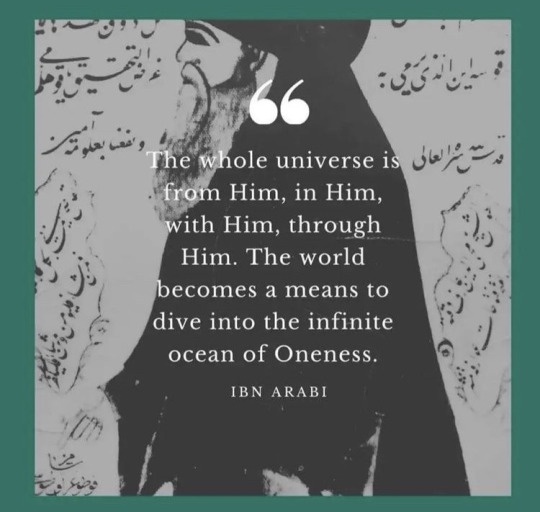
“It is He who is revealed in every face, sought in every sign, gazed upon by every eye, worshipped in every object of worship, and pursued in the unseen and the visible. Not a single one of His creatures can fail to find Him in its primordial and original nature.”
― Ibn 'Arabi, Futûhât al-Makkiyya
#ibn arabi#Futûhât al-Makkiyya#sufi gnosis#sufi wisdom#oneness#awakening#enlightenment#primordial nature#nonduality#Ocean of Oneness
32 notes
·
View notes
Quote
It is He who is revealed in every face, sought in every sign, gazed upon by every eye, worshipped in every object of worship, and pursued in the unseen and the visible. Not a single one of His creatures can fail to find Him in its primordial and original nature.
Ibn 'Arabi, Futûhât al-Makkiyya
144 notes
·
View notes
Text
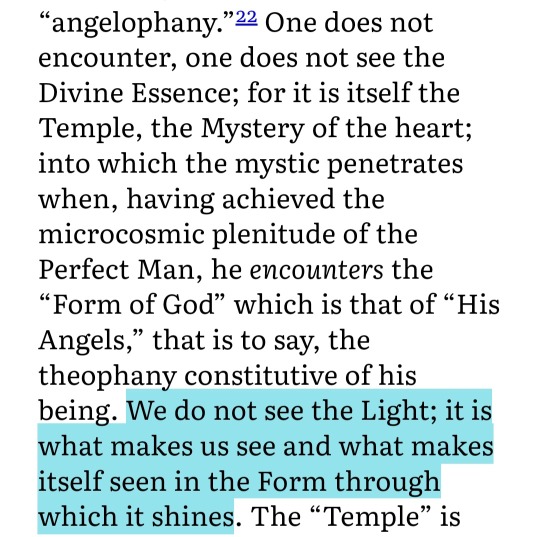
Henry Corbin, Alone With The Alone: Creative Imagination in the Sufism of Ibn 'Arabi
20 notes
·
View notes
Quote
The benefit of the knowledge of the self is to know for certain that you are neither existent nor nonexistent, that you are not, never have been and never will be.
Ibn ‘Arabi / Balyani, Know Yourself: An Explanation of the Oneness of Being, translated by Cecilia Twinch
#quote#Ibn Arabi#Balyani#Sufism#mysticism#know thyself#self-knowledge#spirituality#existence#existential#existentialism#Cecilia Twinch#Sufi#ontology#philosophy
295 notes
·
View notes
Text



—Henry Corbin, Alone with the Alone: Creative Imagination in the Sūfism of Ibn ‘Arabī
“Perhaps the flower, whose heliotropism proves to be its ‘heliopathy,’ will put us on the path…”
“Proclus ‘listening’ to the flower pray…”
Stunned I’m only reading this after writing THE SUNFLOWER CAST A SPELL TO SAVE US FROM THE VOID and ALIEN DAUGHTERS WALK INTO THE SUN… I’ve fully surrendered to the oneiric heliotropism of the path of mystery! (Maybe I’m ready for my neoplatonist phase?)
#Henry Corbin#mysticism#sufism#islamic mysticism#philosophy#neoplatonism#literature#ibn arabi#ibn ‘arabi#heliotrope#flowers#proclus
53 notes
·
View notes
Text

“Passion has seized hold of the reins of my heart. So wherever I turn my gaze, passion is facing me.” - Ibn Arabi
The Passion 11/09/2023 © All Rights Reserved by Jamil Hussain
#lovely#photography#poetic#beautiful#beauty#photos#photooftheday#pictures#flowers#roses#ibn arabi#poetry#passion#heart#gaze#facing#red roses#red flowers#gorgeous#passionate#blissful#so gorgeous#sweet words#insipration#motivatingwords#charming#pretty words#so pretty#adorable#delicate
38 notes
·
View notes
Text

Bizde büyük ya da güçlü olan kazanmaz oğul,
ALLAH c.c. kimin yanındaysa o kazanır ...
Hz Muhyiddin İbn Arabi
Ve ALLAH bizimleydi
(inananlar kazandı)
Koşturmak bizdendi
Ama Zafer ALLAH'tan.
(Elhamdülillah)
21 notes
·
View notes
Text
Fifth part of the bookscans of Al Andalus. Historical Figures, here's the previous part
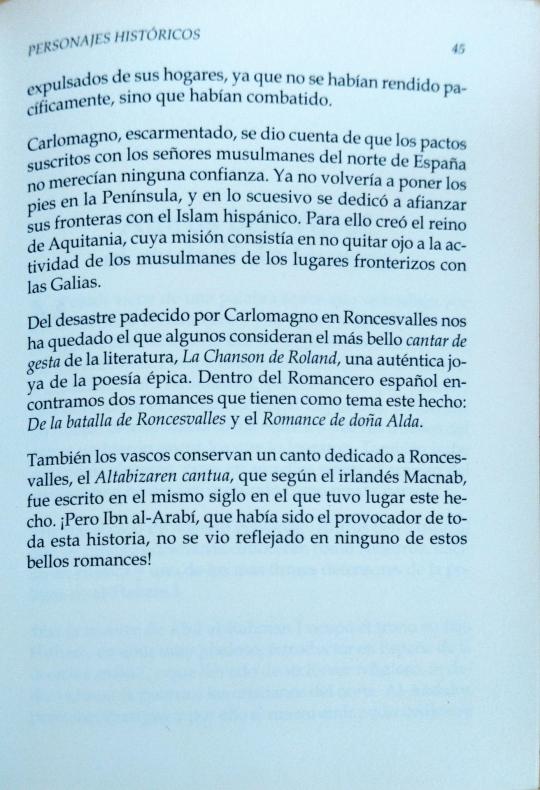
expelled from their homes, since they had not surrendered peacefully, but had fought.
Charlemagne, chastened, realized that the pacts signed with the Muslim lords of northern Spain deserved no trust. He would never set foot on the Peninsula again, and subsequently dedicated itself to strengthening its borders with
Hispanic Islam. For this he created the kingdom of Aquitaine, whose mission
consisted of not taking our eyes off the activity of the Muslims of the
places bordering Gaul.
From the disaster suffered by Charlemagne in Roncesvalles we have
remains what some consider the most beautiful song of deeds of literature, La Chanson de Roland, an authentic gem of the epic poetry. Within the Spanish Ballads we find two romances that have this fact as their theme: Of the battle of
Roncesvalles and the Romance of Doña Alda.
The Basques also preserve a song dedicated to Roncesvalles, the Altabizaren cantua, which according to the Irishman Macnab, was written in the same century in which this event took place. But
Ibn al-Arabí, who had been the originator of this whole story, was not reflected in any of these beautiful romances!
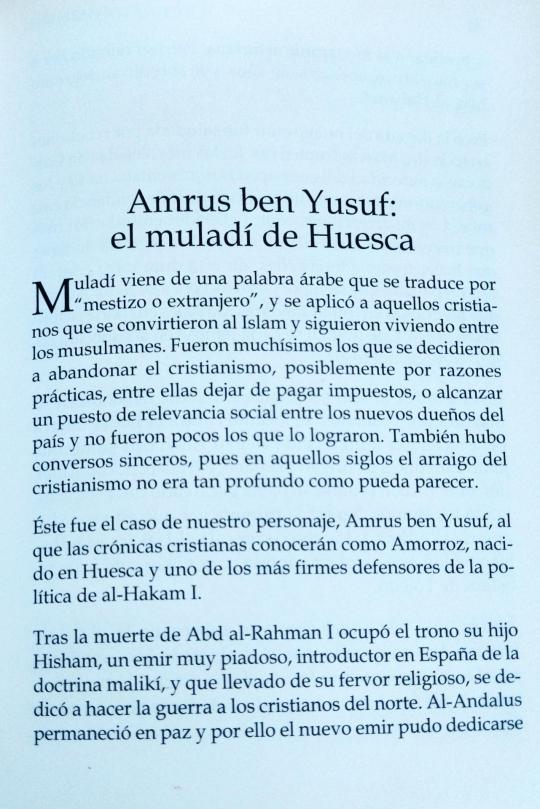
Amrus ben Yusuf:
the muladí of Huesca
Muladí comes from an Arabic word that translates as "mixed race or foreigner", and was applied to those Christians who converted to Islam and continued living among the Muslims.
There were many who decided
to abandon Christianity, possibly for practical reasons, including stopping paying taxes, or reaching a position of social relevance among the new owners of the country and there were not a few who achieved it. There was also sincere converts, since in those centuries the roots of the Christianity was not as deep as it may seem.
This was the case of our character, Amrus ben Yusuf, whom the Christian chronicles will know him as Amorroz, born in Huesca and one of the staunchest defenders of the policies of al-Hakam I.
After the death of Abd al-Rahman I, his son Hisham, a very pious emir, introducer of the Maliki doctrine in Spain, and who
Driven by his religious fervor, he dedicated himself to waging war on the Northern Christians. Al-Andalus remained at peace and therefore the new emir was able to dedicate himself
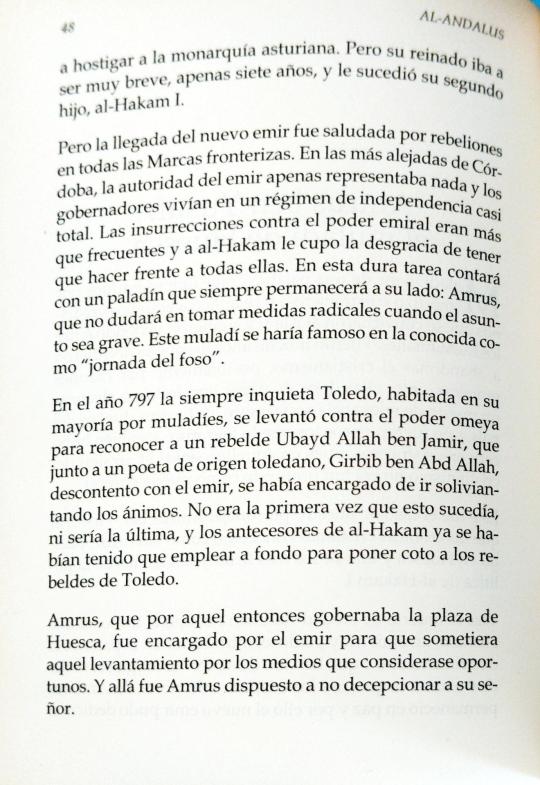
to harass the Asturian monarchy. But his reign was to be very short, just seven years, and was succeeded by his second son, al-Hakam I.
But the arrival of the new emir was greeted with rebellions in all the border marches. In the most remote areas of Córdoba, the authority of the emir hardly represented anything and the governors lived in a
regime of almost total independence. The insurrections against the power of the emirate were more than frequent and al-Hakam had the unfortunate luck to have to face them all. In this hard task, he will have a paladin who will always be at his side: Amrus, who will not hesitate to take radical measures when the matter is serious. This muladí would become famous on what was known as the “day of the pit.”
In the year 797, the always restless Toledo, inhabited mostly by muladíes, rose up against the Umayyad power to recognize a
rebel Ubayd Allah ben Jamir, who together with a poet of Toledo, Girbib ben Abd Allah, dissatisfied with the emir, had
in charge of calming down the spirits. It wasn't the first time this happen, nor would it be the last, and al-Hakam's predecessors had already had to work hard to put a stop to the rebels of Toledo.
Amrus, who at that time ruled the stronghold of Huesca, was commissioned by the emir to subdue that uprising by the means that it considers opportune. And there went Amrus willing not to disappoint his lord.
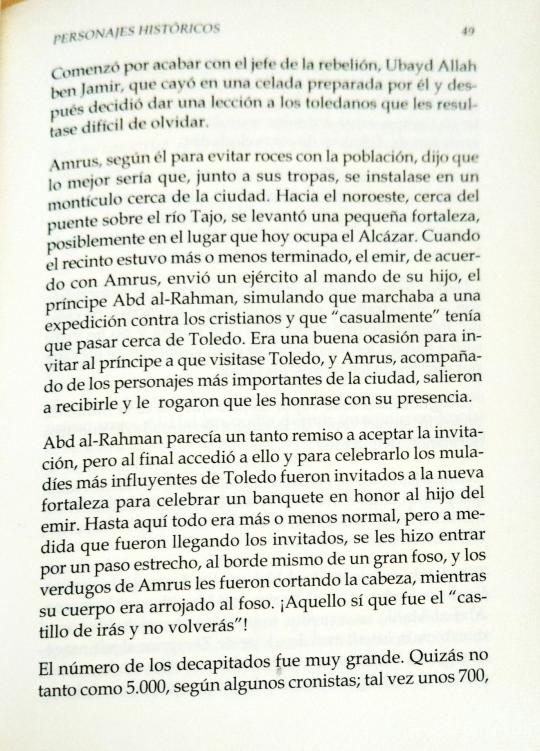
He began by eliminating the leader of the rebellion, Ubayd Allah ben Jamir,
who fell into a trap prepared by him and then decided to give a lesson to the people of Toledo that they would find difficult to forget.
Amrus, according to him to avoid friction with the population, said that the best
would be that, along with his troops, he would settle on a mound near the
city. Towards the northwest, near the bridge over the Tagus River, rose
a small fortress, possibly on the site now occupied by the Alcazar. When the enclosure was more or less finished, the emir, in agreement with Amrus, he sent an army under the command of his son, the prince Abd al-Rahman, pretending that he was going on an expedition against the
Christians and that "coincidentally" had to pass near Toledo. It was a good occasion to invite the prince to visit Toledo, and
Amrus, accompanied by the most important people of the city, they came out to receive him and begged him to honor them with his presence.
Abd al-Rahman seemed somewhat reluctant to accept the invitation, but
In the end he agreed to it and to celebrate it the most influential mula-díes
of Toledo were invited to the new fortress to celebrate a banquet in honor of the emir's son. Until then everything was more or less normal, but as the guests arrived, they became enter through a narrow passage, at the very edge of a large ditch, and the Amrus's executioners cut off their heads, while their bodies was thrown into the pit. That was the " castle of you will go and no you will come back"!
The number of those beheaded was very large. Maybe not as much as
5,000, according to some chroniclers; maybe about 700
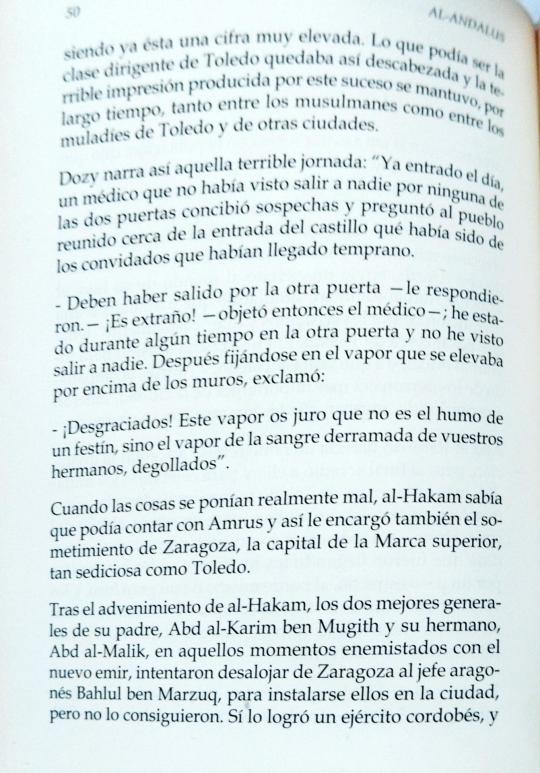
being a very high number. What the leading class of Toledo was thus beheaded and the terrible impression produced by this event remained, for a long time, both among the Muslims and among the muladies of Toledo and from other cities.
Dozy narrates that terrible day like this: "At daybreak, a doctor that had not seen anyone leave through either of the two door, became suspicious and asked the people gathered near the entrance of the castle what had happened to the guests who had arrived early.
"They must have gone out through the other door," they answered- It's strange!-the doctor then objected -; I have been for some time at the other door and I haven't seen anyone leave. After watching the steam rising above the walls,
exclaimed:
Unfortunates! I swear to you that this vapor is not the smoke of a feast,
but the vapor of the shed blood of your brothers, beheaded"
When things got really bad, al-Hakam knew that he could count on Amrus and so he also entrusted him with the submission
of Zaragoza, the capital of the Upper March, as seditious as Toledo.
After the advent of al-Hakam, the two best generals of his father, Abd al-Karim ben Mugith and his brother, Abd al-Malik, in
those moments at enmity with the new emir, they tried to evict the Aragonese chief Bahlul ben Marzuq from Zaragoza, to
They settled in the city, but they did not succeed. He got a Cordoban army, and
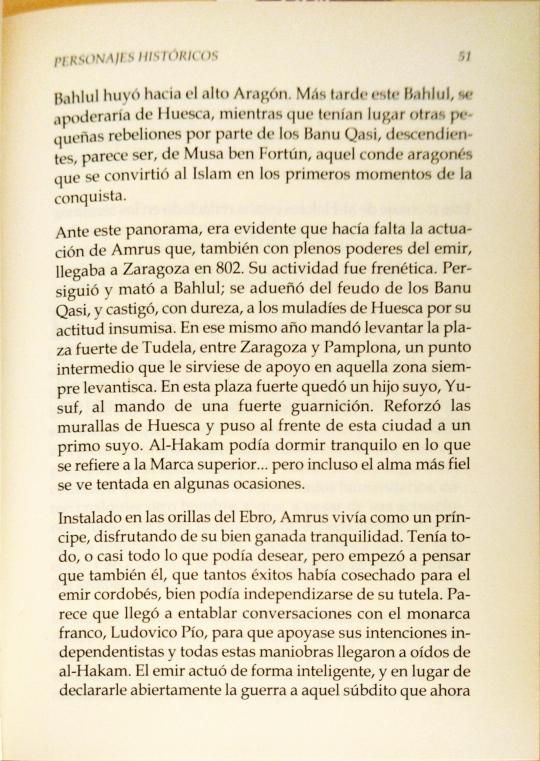
Bahlul fled towards upper Aragon. Later this Bahlul, would take over Huesca, while other small rebellions by the Banu Qasi took place, who were descendants, it seems, of Musa ben Fortún, that Aragonese count who converted to
Islam in the first moments of the conquest.
Given this panorama, it was evident that the action of Amrus who, also with full powers of the emir, came to Zaragoza in 802. Its activity was frenetic. Persecuted and killed Bahlul; took over the fiefdom of the Banu Qasi, and harshly punished
to the muladíes of Huesca for their rebellious attitude. In that same
year he ordered the construction of the stronghold of Tudela, between Zaragoza and Pamplona, an intermediate point that would serve as support in
that always upheaval area. In this stronghold there was his son, Yusuf, commanding a strong garrison. He reinforced the walls of Huesca and put one of his cousins in charge of this city.
Al-Hakam could sleep peacefully when it came to the Upper March... but even the most faithful soul is tempted in some
occasions.
Installed on the banks of the Ebro, Amrus lived like a prince, enjoying your well-earned peace of mind. He had everything, or almost everything he could want, but he began to think that he too,
which had garnered so much success for the emir of Cordoba, could become independent of his tutelage. It seems that he came to engage conversations with the Frankish monarch, Louis the Pious, so that
supported their independence intentions and all these maneuvers reached al-Hakam's ears. The emir acted
intelligent, and instead of openly declaring war on that subject that now
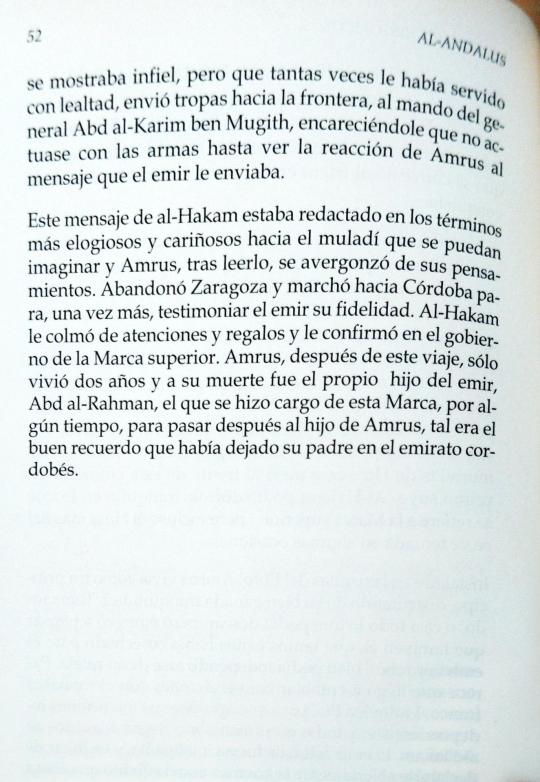
showed to be unfaithful, but that he had served him so many times with loyalty, he sent troops to the border, under the command of General Abd al-Karim ben Mugith, urging him not to act with the
weapons until seeing Amrus's reaction to the message that the emir gave him.
This message from al-Hakam was written in the most praiseworthy and affectionate towards the muladí that you can imagine and Amrus, after reading it, was ashamed of his thoughts. He left Zaragoza and marched towards Córdoba to, once again, bear witness the emir his fidelity. Al-Hakam showered him with attention and gifts and confirmed him in the government of the Upper March. Amrus, after
of this trip, he only lived two years and at his death the son of the emir, Abd al-Rahman, took charge of this March, for
some time, to later pass to the son of Amrus, such was the good memory that his father had left in the emirate of Cordoba.
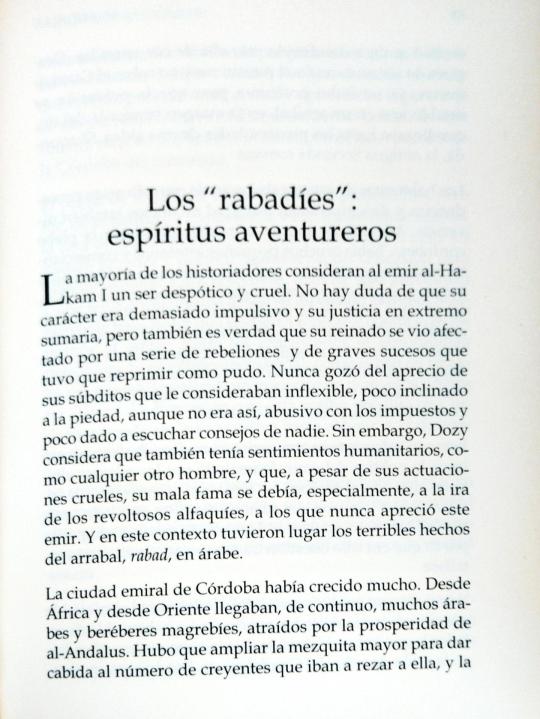
The "Rabadis":
adventurous spirits
Most historians consider the emir al-Ha-kam I despotic and cruel. There is no doubt that his character was too impulsive and his justice extremely summary, but it is also true that his reign was affected by a series of rebellions and serious events that he had to repress as best he could. He never enjoyed the appreciation of his subjects who considered him inflexible, little inclined to piety, although it was not like that, abusive with taxes and little given to listening advice from no one. However, Dozy believes that he also had humanitarian feelings, like any other man, and that, despite of his cruel actions, his bad reputation was due, especially, to the
wrath of the rebellious alfaquis, whom this emir never appreciated. And in this context, the terrible events of the suburb, rabad in Arabic, took place.
The emiral city of Córdoba had grown a lot. From Africa and from the East any Arabs and Berbers from the Maghreb continually arrived attracted by the prosperity of al-Andalus. The mosque had to be expanded larger to accommodate the number of believers who came to pray to it, and

The city was expanding beyond its walls. After the Roman bridge over the Guadalquivir was restored, there was no longer a problem for the population to settle in a suburb on the left bank of the river, which reached the vicinity
from a village, Shaqunda, ancient Roman Secunda.
The inhabitants of this suburb were of very diverse origins and they carried out a multitude of diverse jobs. Besides
of what could be considered the Cordoba plebs, there were many small Mullawad and Christian artisans and merchants, but
due to its proximity to the main mosque and the emiral palace, many Cordobans who were employed, either in the mosque or in the palace, they settled there. Among this diverse population, also found the alfaquíes, religious leaders of the doctrine
Malikí, who had reached a very prominent position and a very notable influence at court, especially with the emir
Hisham, father of al-Hakam I.
This suburb will soon become a focus of discontent towards the emir's policy, promoted by the same alfaquies who with
al-Hakam had neither the appreciation nor the influence that they achieved with
his predecessor. On the other hand, in the city al-Hakam did not enjoy of many sympathies so it was only a matter of time before the situation exploded.
And it happened that one day a rumor spread through the city that seventy-two leading citizens had been executed and that their corpses were going to be exposed, crucified, on the right bank
of the Guadalquivir. The mood be-
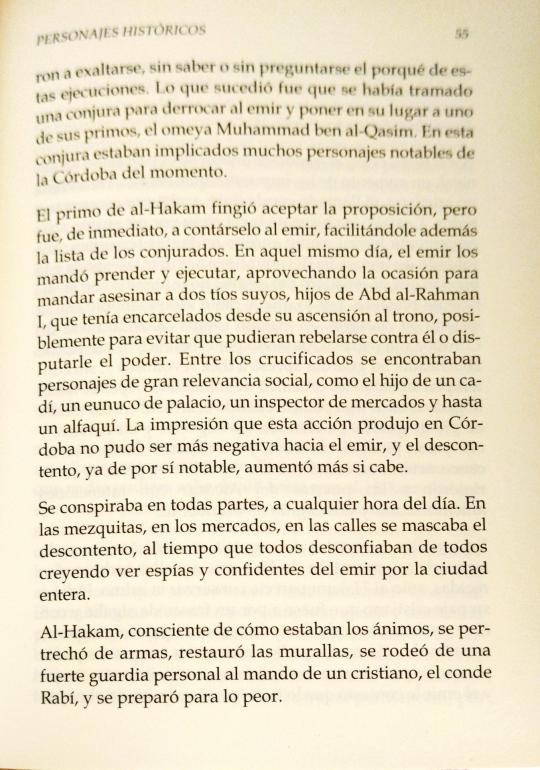
gan to exalt, without knowing or without asking themselves the reason for these executions. What happened was that a plot had been hatched to overthrow the emir
and put in his place one of his cousins, the Umayyad Muhammad ben al-Qasim. Many notable people from the Córdoba of that time were involved in this conspiracy.
Al-Hakam's cousin pretended to accept the proposal, but was immediately
to tell the emir, also providing him with the list of the conspirators. Inthat same day, the emir ordered them to be arrested and executed, taking advantage of the
occasion to order the murder of two of his uncles, sons of Abd al-Rahman I, who had been imprisoned since his ascension to the throne, possibly to prevent them from rebelling against him or challenging him for power. Between the crucified were figures of great social relevance, such as the
son of a cadi, a palace eunuch, a market inspector and even a alfaqui. The impression that this action produced in Córdoba could not be more negative towards the emir, and the discontent, already notable, increased.
There was a plotting everywhere, at any time of the day. In the mosques, in the markets, in the streets discontent was chewed, while everyone distrusted everyone, believing they saw spies and
confidants of the emir throughout the entire city.
Al-Hakam, aware of the mood, equipped himself withweapons, restored the walls, surrounded himself with a strong personal guard under the command of a Christian, Count Rabí, and prepared himself for the worst.
#book scans#al andalus. historical figures#al andalus. personajes históricos#al andalus#al andalus history#bookblr#historyblr#spanish history#sulayman ibn yaqzan ibn al-arabi#amrus ibn yusuf#rabadies#rabadi#al hakam i#al hakam i of córdoba#emirate of cordoba#umayyad emirate of córdoba#middle ages#rabadid dinasty#hisham i#hisham i of cordoba
9 notes
·
View notes
Text

Morning, a dove cooing
no world can hold your song.
Who can bear
love's sorrows
or swallow fate's bitter portion?
Heartbroken I cry,
O You who put me through this,
will You care for me now?
—Ibn ‘Arabi
10 notes
·
View notes
Text
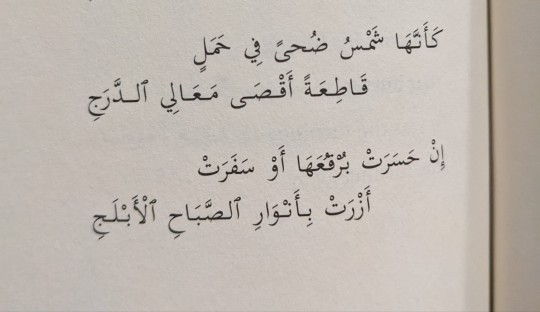
Like the afternoon sun arcing
Over Aries
When she lowers her veil, she covers
dawn in her morning light
56 notes
·
View notes
Text
Do not praise your own faith so exclusively that you disbelieve all the rest. If you do this you will miss much good. Nay, you will miss the whole truth of the matter. God, the Omniscient and the Omnipresent, cannot be confined to any one creed, for He says in the Quran, wheresoever ye turn, there is the face of Allah. Everybody praises what he knows. His God is his own creature, and in praising it, he praises himself. Which he would not do if he were just, for his dislike is based on ignorance.
Ibn Arabi
#ibn arabi#quotes#religion#karen armstrong#arabic quotes#god#allah#the perennial philosophy#theism#devotional polytheism
24 notes
·
View notes